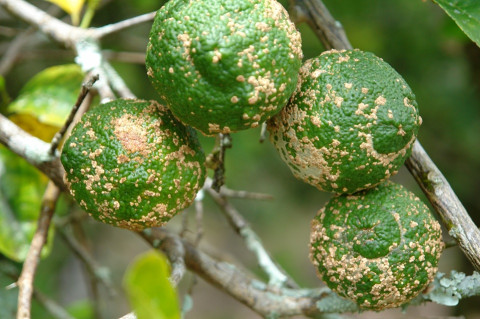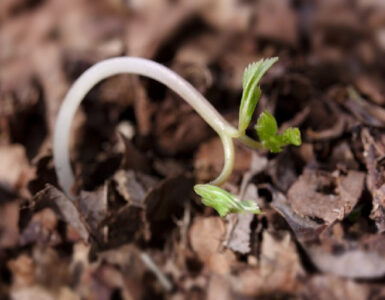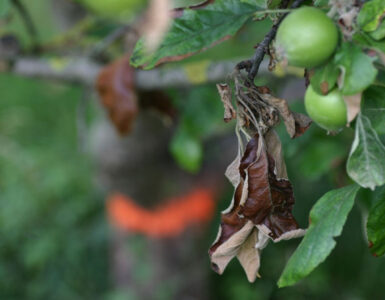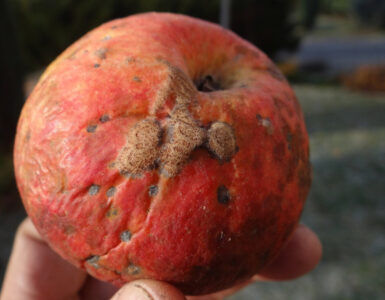Citrus trees can be an absolute joy to grow, but they aren’t immune to problems. One of the most frustrating issues these trees face is citrus scab.
Those rough, wart-like scabs that pop up on fruits, leaves, and twigs can make even the healthiest trees look sickly. The disease can ruin your harvest and weaken the tree over time.
Thankfully, as we will discuss, there are safe and natural ways to keep citrus scab under control.
Identification
Citrus scab is a fungal disease caused by a fungus [1]. It usually appears as slightly raised, scabby lesions that start pinkish and later turn gray, then brown.
These spots can show up on the fruit, leaves, and even twigs of citrus trees.
While the disease doesn’t usually kill trees, it can affect fruit quality. The fruits become unattractive, and their market value is reduced.
The citrus trees most commonly affected are lemons, grapefruits, sour oranges, sweet oranges, mandarins, and tangerines.
How to Treat and Control Citrus Scab Naturally
There are several safe and natural ways to treat and control citrus scab before it spreads. We’ll highlight some home remedies and natural solutions that you can try.
1. Prune Regularly
Good airflow around your citrus tree helps leaves dry faster and discourages fungal development. Regular pruning also allows sunlight to reach inner branches, creating a less favorable environment for fungi.
Therefore, remove dead, diseased, or crowded branches. However, be sure to disinfect your pruning shears between cuts.
2. Neem Oil
Neem oil is a trusted natural remedy for many plant diseases, including citrus scab. It can help suppress this plant disease.
To use neem oil to make a homemade citrus scab spray, mix two tablespoons of cold-pressed neem oil with a gallon of water. Also, add one tablespoon of mild liquid soap to the mixture.
Shake well and spray this DIY solution on the affected parts of your citrus trees. Reapply every seven to ten days during the growing season.
3. Avoid Overhead Irrigation
Since citrus scab spreads mainly through splashing water [2], overhead watering can make the problem worse.
Instead, switch to drip irrigation or soaker hoses that deliver water directly to the root zone.
This method keeps the leaves and fruit dry. It reduces the humidity around the tree and limits the spread of fungal spores.
4. Baking Soda
Baking soda is another remedy that can help treat citrus scab disease. It is a natural antifungal agent that can help reduce fungal growth on trees.
To make a simple spray, mix one tablespoon of baking soda and one teaspoon of mild liquid soap in a gallon of water. Shake well and spray it on the affected leaves, fruits, and stems.
Apply the solution once a week during wet weather or when the disease is active.
5. Intercrop with Non-Citrus Trees
Growing your citrus trees alongside non-citrus plants can also help reduce the risk of disease spread. When citrus trees are planted close together, fungal spores can easily move from one to another.
Therefore, if you’re growing multiple citrus varieties, try not to plant them too close together.
Also, if you remove an infected tree, avoid planting another citrus tree in the same spot. Intercropping with non-host plants like guava, pomegranate, or papaya helps create a natural barrier. This limits spore transfer.
6. Clean Up Leaf Litter and Dead Twigs
Citrus scab spores can overwinter in fallen leaves, infected twigs, and mummified fruit on the ground. That’s why keeping the area clean is vital.
Therefore, regularly rake up fallen leaves, pruned branches, and dropped fruit. Dispose of them away from your garden or orchard.
Cleaning up your garden reduces the sources of reinfection and gives your citrus trees a better chance of staying healthy.
7. Encourage Healthy Growth
A strong, healthy citrus tree is far less likely to suffer from diseases like scab.
Therefore, feed your tree things like organic compost or slow-release natural fertilizers. These will support balanced growth.
Also, ensure your tree gets full sunlight and isn’t planted too close to other trees, which can trap humidity around the foliage.
8. Bonide Captain Jack’s Orchard Spray
Bonide Captain Jack’s Orchard Spray is an organic fungicide and pesticide that can help control citrus scab.
It contains sulfur and pyrethrins. Both ingredients target fungal diseases organically.
This spray can be applied to fruits, leaves, and stems to prevent new infections and protect fresh growth. Use it as directed on the container.
9. Cueva Fungicide
Cueva Fungicide is another organic treatment for managing citrus scab.
It’s a copper-based fungicide approved for organic use. Copper works by preventing fungal spores from germinating and spreading.
Spray the solution on your trees, ensuring good coverage of both the leaves and fruit. Reapply according to label directions.
Cueva is particularly effective as a preventive spray before the infection starts.
10. Monterey Liquid Copper Fungicide
Monterey Liquid Copper Fungicide is another copper-based option that helps treat citrus scab naturally. It is known for its ease of use and effectiveness against a range of fungal diseases.
Like Cueva, it works by stopping fungal spores before they can cause further damage.
It works great as a citrus tree fungicide. Mix it according to the label and spray it evenly over the tree.
Takeaway
Getting rid of citrus scab naturally is all about prevention and consistency. Also, ensure your trees have a healthy environment.
Nature already provides the tools you need—like neem oil, baking soda, and good old-fashioned sunlight.
Do your part and keep your garden or orchard clean, your trees well cared for, and moisture levels in check.








Add comment